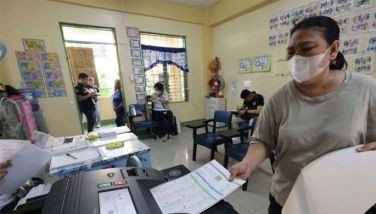DepEd, CHED urged to beef up computer literacy programs
November 1, 2002 | 12:00am
Sen. Ramon Revilla is urging the Commission on Higher Education (CHED) and the Department of Education to beef up the implementation of their computer literacy programs to take advantage of the severe shortage of professionals in the United States, Canada, Australia and Western Europe.
Revilla, chairman of the Senate labor committee, said local professionals in the fields of education, accounting and health care services, which include nurses and laboratory technicians, who have a firm grasp of information technology (IT) will likely get a sizable chunk of the global employment pie in view of the prevailing talent crisis in First World countries.
"Several studies indicate that the talent crisis in these countries may last for the next 20 years. Government and private institutions must work together and take advantage of this shortage by producing IT-literate professionals in these fields to make them more globally competitive," Revilla said.
He said an acute shortage of urban teachers in critical subjects like math, science and special education in the US is predicted in a report released by the Recruiting New Teachers Inc. (RNT), the Council of Great City Schools and the Council of Great City Colleges of Education.
According to the report titled "The Urban Teacher Challenge," virtually all of the largest urban school districts in the US responding to a national survey, reported their immediate need for teachers in math (95 percent), science (98 percent) and special education (98 percent).
There are also shortages of teachers in bilingual education (73 percent), English as a second language (68 percent) and educational technology (68 percent). Demographers conclude that 2.2 million teachers will be needed in the US over the next 10 years.
The report attributes the talent crisis to the fact that about 76 million professionals are due for retirement in the next 30 years and that not enough Americans are trained for the jobs. Statistics indicate that labor-saving technology and immigration may partially fill the vacuum, but there will still be a shortage of four to six million skilled workers by 2010.
Revilla, chairman of the Senate labor committee, said local professionals in the fields of education, accounting and health care services, which include nurses and laboratory technicians, who have a firm grasp of information technology (IT) will likely get a sizable chunk of the global employment pie in view of the prevailing talent crisis in First World countries.
"Several studies indicate that the talent crisis in these countries may last for the next 20 years. Government and private institutions must work together and take advantage of this shortage by producing IT-literate professionals in these fields to make them more globally competitive," Revilla said.
He said an acute shortage of urban teachers in critical subjects like math, science and special education in the US is predicted in a report released by the Recruiting New Teachers Inc. (RNT), the Council of Great City Schools and the Council of Great City Colleges of Education.
According to the report titled "The Urban Teacher Challenge," virtually all of the largest urban school districts in the US responding to a national survey, reported their immediate need for teachers in math (95 percent), science (98 percent) and special education (98 percent).
There are also shortages of teachers in bilingual education (73 percent), English as a second language (68 percent) and educational technology (68 percent). Demographers conclude that 2.2 million teachers will be needed in the US over the next 10 years.
The report attributes the talent crisis to the fact that about 76 million professionals are due for retirement in the next 30 years and that not enough Americans are trained for the jobs. Statistics indicate that labor-saving technology and immigration may partially fill the vacuum, but there will still be a shortage of four to six million skilled workers by 2010.
BrandSpace Articles
<
>
- Latest
Latest
Latest
January 29, 2025 - 9:47am
By Glenn Chapman | January 29, 2025 - 9:47am
January 27, 2025 - 7:01pm
By Oliver Hotham | January 27, 2025 - 7:01pm
January 19, 2025 - 12:39pm
By Alex Pigman | January 19, 2025 - 12:39pm
January 19, 2025 - 10:05am
By Alex Pigman | January 19, 2025 - 10:05am
January 6, 2025 - 11:05pm
January 6, 2025 - 11:05pm
Recommended




























